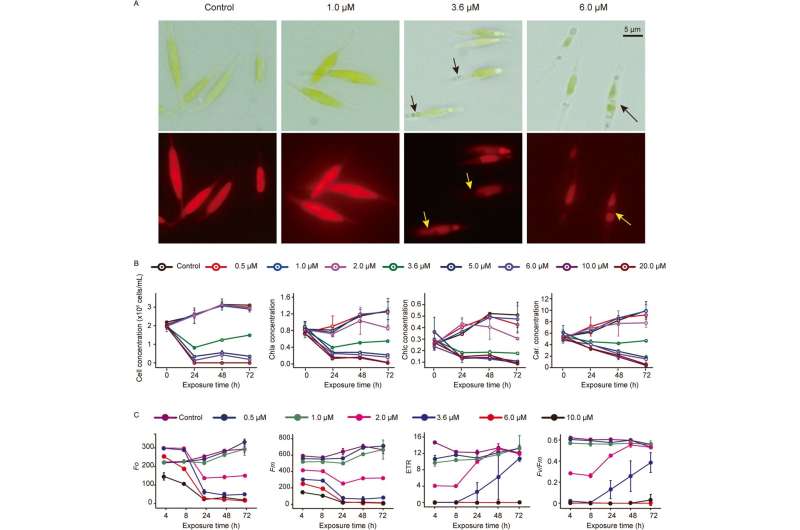This article has been reviewed according to Science X's editorial process and policies. Editors have highlighted the following attributes while ensuring the content's credibility:
fact-checked
peer-reviewed publication
trusted source
proofread
Study reveals how marine bacteria combat algae

Algae and bacteria are inseparable in ocean ecosystems, with bacteria playing a crucial role in regulating the growth and metabolism of algae. In addition to mutualism, bacteria have developed various molecular-based strategies to combat algae.
Recently, researchers from the Qingdao Institute of Bioenergy and Bioprocess Technology (QIBEBT) of the Chinese Academy of Sciences (CAS) have discovered a novel chemical that is widely used by bacteria to combat algae in the ocean.
Their findings were published in The ISME Journal on Sept. 8.
The researchers isolated a marine bacterium with algae-killing activity against a variety of algae, including diatoms, green algae, and dinoflagellates. They revealed that the lethal effect on algae was determined by a small molecule called 3,3',5,5'-tetrabromo-2,2'-biphenyldiol (abbreviated as 4-BP) synthesized and released by the bacteria.
The synthesis of 4-BP is determined by a gene cluster that includes three genes encoding chorismate lyase, flavin-dependent halogenase and cytochrome P450.
The algae-killing function of 4-BP is achieved by inhibiting the synthesis of plastoquinone-9 in algae, which is a crucial component in the electron transport chain in the photosystem of algae. When 4-BP is introduced into simulated blooming seawater, algal abundance is effectively suppressed.
Importantly, the researchers found that the synthesis genes for 4-BP are present in diverse bacteria in global oceans, suggesting that 4-BP is a bacterial tool widely used in global oceans to mediate antagonistic bacteria-algae relationships.
More information: Zenghu Zhang et al, Plastoquinone synthesis inhibition by tetrabromo biphenyldiol as a widespread algicidal mechanism of marine bacteria, The ISME Journal (2023). DOI: 10.1038/s41396-023-01510-0
Journal information: ISME Journal
Provided by Chinese Academy of Sciences

















